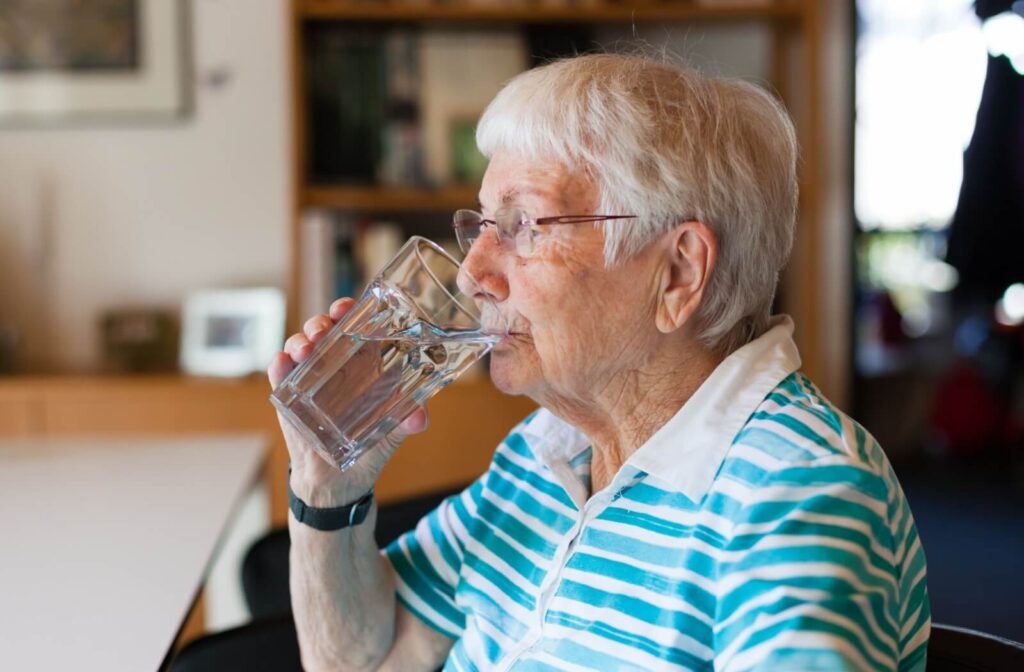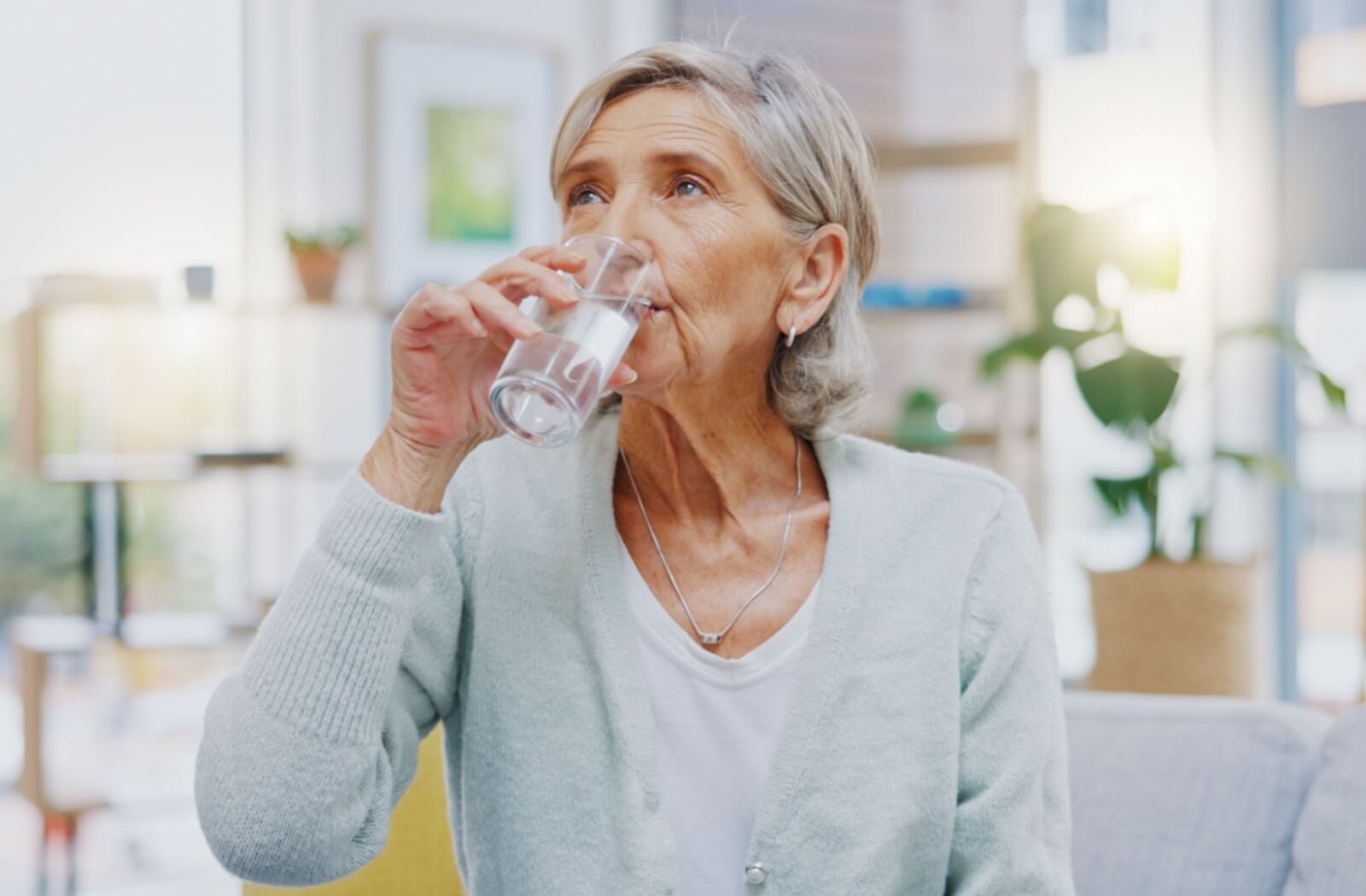Key Takeaways
- Hydration is essential for brain function, mood stability, and memory in seniors.
- Staying hydrated supports joint health, circulation, and energy levels.
- Seniors face higher dehydration risks due to age, medications, and health conditions.
- Caregivers can help by watching for warning signs and encouraging fluid intake daily.
Staying hydrated is essential for overall health, directly affecting both the mind and body. For seniors, drinking enough fluids helps maintain sharp thinking, stable moods, steady mobility, and lasting energy. In contrast, dehydration can cause fatigue, disorientation, joint discomfort, and even serious medical concerns. By making hydration a daily priority, families can safeguard their loved one’s independence while supporting long-term wellness.
What Role Does Hydration Play in Senior Health?
Water regulates nearly every system in the body. It cushions joints, aids digestion, stabilizes blood pressure, and carries nutrients to cells. Without enough fluids, the body cannot perform these functions effectively, leading to both immediate discomfort and long-term health issues.
Key physical benefits of hydration include:
- Temperature control: Prevents overheating, especially during warm weather.
- Joint lubrication: Reduces stiffness and discomfort when moving.
- Digestive support: Prevents constipation and improves nutrient absorption.
- Circulation: Ensures oxygen and nutrients reach every part of the body.
For seniors, maintaining hydration helps preserve daily independence, supporting energy levels, movement, and comfort in everyday tasks.
Why Are Seniors at Higher Risk of Dehydration?
As people age, their bodies undergo changes that increase the likelihood of dehydration and its associated risks. Seniors often do not feel thirsty until dehydration has already set in.
Common reasons for a higher risk of dehydration in seniors include:
- Diminished thirst cues: Older adults may not recognize when their body needs fluids.
- Medication side effects: Diuretics, laxatives, and blood pressure drugs increase fluid loss.
- Mobility challenges: Difficulty walking may discourage trips to the kitchen or restroom.
- Chronic health conditions: Diabetes, kidney disease, or heart issues complicate fluid balance.
- Environmental factors: Hot weather or lack of cooling systems can quickly worsen dehydration.
Caregivers can lower risks by offering fluids consistently, rather than waiting for seniors to ask for them.
What Are the Warning Signs of Dehydration in Seniors?
Dehydration does not always appear obvious at first, but early detection is crucial to prevent complications such as urinary tract infections, kidney issues, or hospital visits.
Mild to moderate signs of dehydration include:
- Dry mouth, lips, or tongue
- Fatigue or weakness
- Dark-colored urine or reduced urination
- Headaches or lightheadedness
- Confusion or forgetfulness
In more advanced cases, severe dehydration can progress to:
- Rapid heartbeat
- Sunken eyes
- Fainting or dizziness when standing
- Severe disorientation
When these symptoms appear, medical attention may be required.

How Does Hydration Affect Brain Function in Seniors?
Water is essential for keeping the brain sharp and balanced. Even mild dehydration can disrupt how the brain processes information, and for seniors (who may already face natural age-related changes), these effects can feel even more pronounced.
Effects of dehydration on the brain may include:
- Reduced memory recall and difficulty concentrating
- Slower reaction times and decreased alertness
- Increased irritability or mood swings
- Higher risk of delirium in hospital or care settings
On the other hand, staying well hydrated directly supports mental performance. Seniors who drink enough fluids often experience clearer thinking, better focus, and improved attention span. Hydration also contributes to emotional stability by reducing irritability and fatigue, helping older adults feel more balanced throughout the day.
For those living with mild cognitive impairment or early dementia, hydration is especially important. Consistent fluid intake can help stabilize daily functioning, reduce confusion, and provide a stronger foundation for memory and communication. In this way, something as simple as drinking water can play a critical role in protecting brain health and maintaining independence.
What Are the Physical Health Benefits of Staying Hydrated?
While brain health is a critical part of hydration, physical benefits are equally significant for seniors who wish to remain active and independent.
Daily benefits of hydration for the physical body include:
- Digestive health: Keeps bowel movements regular, reducing constipation.
- Joint protection: Maintains cartilage lubrication, reducing stiffness.
- Cardiovascular support: Helps regulate blood pressure and maintain circulation.
- Energy levels: Reduces fatigue and increases stamina for daily activities.
- Immune health: Assists the body in flushing toxins and transporting nutrients.
For seniors, these benefits mean greater ease in walking, exercising, or simply enjoying social events without the burden of fatigue or discomfort.
What Are Easy Ways for Seniors to Stay Hydrated?
Encouraging hydration does not have to be complicated or involve plain water alone. Many seniors benefit from adding variety and routine to their fluid intake.
Creative Strategies to Encourage Hydration
- Fruit-infused water: Add lemon, cucumber, or berries for flavor.
- Herbal teas: Caffeine-free options provide hydration and comfort.
- Broth-based soups: A warm, nourishing way to increase fluids.
- Water-rich foods: Cucumbers, watermelon, oranges, and strawberries boost fluid intake.
- Hydration schedule: Encourage sipping water throughout the day instead of large amounts at once.
- Accessible drinks: Keeping water bottles or cups within reach makes staying hydrated easier.
Caregivers can also make hydration part of mealtimes and daily activities, turning it into a natural habit rather than a chore.
Discover How Our Community Supports Wellness
At All American Assisted Living at Tinton Falls, we understand that hydration is a foundation of overall health. That’s why our community prioritizes easy access to refreshing drinks, nutritious meals, and support from attentive staff who encourage consistent hydration.
Our holistic approach ensures that residents not only meet their physical hydration needs but also thrive cognitively and emotionally. Families can rest assured knowing their loved ones are supported in an environment that values safety, dignity, and well-being.
If you are exploring assisted living in Tinton Falls, we invite you to schedule a visit today and see how our wellness-focused lifestyle can help your loved one live fully and with peace of mind.





